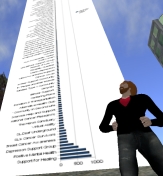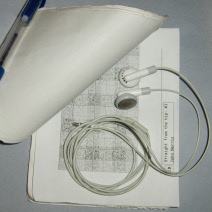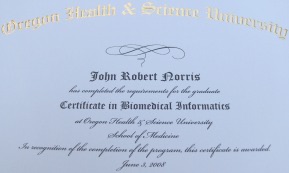I informally gathered some data about Second Life and thought I’d share some findings. I am in no way a statistician, and my data is not complete, so take this all with a grain of salt.
Towards the end of September I took the File Cabinet list from SLHealthy and collected all the health care support groups. In case I missed anything, I used the SL search client inworld to look up all groups with the keyword “support”. There was about 2000 returned items. After the first 100 pages, about 1000 groups, I was not able to view any results as they were private. Of those I did see, I was able to garner an additional 20 or so healthcare groups that were not on the SLHealthy list. (Yup, I added them to SLHealthy). So I now have a list of about 150 groups. (A note of caution, some groups do not fit into nice categories. For instance, I counted Wheelies as a support group, but it could be considered more of a night club.)
How Many Healthcare Support Groups in SL?
The first 1000 “support” groups listed got me 150 actual groups. My first speculation is that the other 1000 “support” groups I was not able to view include other healthcare groups. Of the viewable “support” groups the public healthcare support groups were about 15%. Since healthcare is a private matter, I suspect that there is an even higher percentage of healthcare support groups in the remaining 1000 private “support” groups. I’d feel comfortable saying there are about 200 to 300 healthcare support groups within Second Life. (However, I am a bit leary in that the SL Search showed ‘private’ after exactly 100 pages. It might merely be a bug in the software.)
The Long Tail…many groups many perspectives.
I also noted the number of members in each group. When compared to each other, this gave a classic Long Tail as written about by Chris Anderson. The picture at the top of the post is a bar graph of groups by membership and shows this long tail. Of the 150 groups only about 25 of them have one hundred members or more. Towards the thin, but long part of the tail, there are over 50 groups with less than a dozen members. As Chris explained, the Internet allows folks to publish things cheaply, thus niches that only appeal to a few people and would never be able to make it in old (expensive) media, flourish on-line. For a healthcare support group this is a boon in that it allows those with rare disease to interact with each other. But in a bigger sense, it allows folks with unique approaches to their issues to interact with each other. Thus, we find 19 groups concerning Cancer and 17 groups for Autism/Spectrum disorder. People are making or finding groups that they feel comfortable in.
How many people are involved?
The groups I collected had a total of about 10,000 members. However, since each avatar can join up to 25 groups and a person can have multiple avatars I wouldn’t say I have a great handle on how many people are actually involved in these groups.
Who’s issues are represented?
I then took the groups and tried to categorize them. I decided to use the taxonomy of the American Self-Help Group Clearinghouse. They have been around since the 1980’s, have a database of over 900 support groups, and have their own classification system.
If you look at the number of groups per category as a percentage of the whole you get:
- Abuse: > 1% (Shown in the graphic to the right in yellow)
- Addictions 5% (green)
- Bereavement 4% (light blue)
- Disabilities 21% (dark blue)
- Health 49% (light purple)
- Mental Health 15% (dark purple)
- Miscellaneous 5% (red)
If you look at particular issues, the ones with the most groups are Cancer (19 groups), Autism/Spectrum disorder (17), Addiction and “Mobility” (7 each), HIV (6), and Bereavement (5).
Who’s in the groups?
If we take a look at the number of members in each of the categories as a percentage of the total number of members for all groups, we see a bit of a different breakdown:
- Abuse: > 1%
- Addictions 2%
- Bereavement 1%
- Disabilities 24%
- Health 38%
- Mental Health 31%
- Miscellaneous 2%
While Bereavement counted for 4% or the groups, it only has 1% of the total members. Perhaps this shows that such an issue brings out more varieties of approaches.
Mental Health counted for 15% of the groups but 31% of the total members. This would seem to indicate the opposite of Bereavement. Perhaps in Mental Health more people feel comfortable in fewer groups, unique approaches are not brought out. However, I know that the group with the most members, Support for Healing, has several sub groups within it, that use different approaches, but whose membership is counted in total.
What’s it all mean?
Beyond this discussion, I don’t think my data is clean enough to make any certain pronouncements. However, in general I think it shows that Second Life (Lyndon Lab’s grid) is full of folks helping each other out, that there is a long tail phenomena, and some issues are more represented than others with different groups trying different approaches.
This was all done in a fairly rushed fashion, and as I said, I am not a statistician. I plan on taking a much closer and accurate look at the support groups. Feel free to email me for an Open Office doc of the data.
* These graphs are currently in Second Life at Path Of Support (slurl)
* See also my research with the virtual World IMVU “Healthcare Support Groups in the Virtual World of IMVU“






